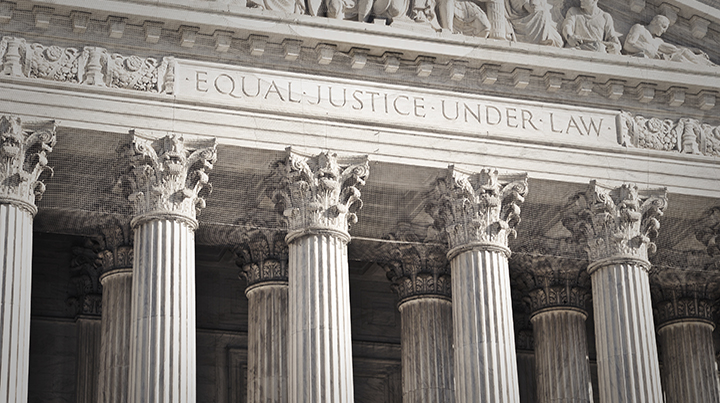The Supreme Court granted certiorari in Cochise Consultancy, Inc. v. United States, ex rel. Hunt to resolve a three-way circuit split over the applicable statute of limitations when the government declines to intervene in a False Claims Act case.
The FCA was enacted in response to widespread fraud related to the sale of wartime necessities to the government during the Civil War. Under the Act’s qui tam provision, an individual, termed a relator, may file a complaint under seal on behalf of the U.S. Government to recover for fraud against the government. Once the complaint is filed, the government is permitted time to investigate the alleged fraud and determine whether it will intervene, and thereby take over the action, or decline to intervene, in which case the relator may pursue the claim themselves. Regardless of whether the government decides to intervene, the recovery belongs to the United States, and the relator receives a share of the recovery.
Relator Billy Joe Hunt worked for The Parsons Corporation in Iraq, managing the day-to-day operations on a contract to clear excess munitions left behind by enemy forces. Hunt alleges that Parsons, influenced by bribes, revoked a security subcontract from a more cost-effective subcontractor and awarded the contract to Cochise Consultancy, Inc. Hunt alleges this resulted in the government paying significantly more for security services than it would have otherwise – at least $1 million more per month from February to September 2006, in addition to paying $2.9 million to secure armored vehicles for Cochise, despite the prior subcontractor already having such vehicles.
On November 30, 2010, Hunt disclosed the purported fraud to FBI agents during an interview related to a separate kickback scheme for which Hunt served ten months in federal prison pursuant to a guilty plea. Upon his release from prison, Hunt filed his complaint under seal on November 27, 2013.
The section of the FCA at issue, 31 U.S.C. § 3731(b), provides two limitations periods applicable to FCA cases:
(b) A civil action under section 3730 may not be brought –
(1) more than 6 years after the date on which the violation of section 3729 is committed, or
(2) more than 3 years after the date when facts material to the right of action are known or reasonably should have been known by the official of the United States charged with responsibility to act in the circumstances, but in no event more than 10 years after the date on which the violation is committed,
whichever occurs last.
The district court ruled the limitations period under subsection (b)(2) was not applicable because that subsection does not apply to cases in which the government declined to intervene. The court therefore dismissed Hunt’s case as time-barred under subsection (b)(1) because it was filed more than six years after the alleged fraud took place. The Eleventh Circuit reversed and remanded, holding that subsection (b)(2)’s “three-year limitations period applies to an FCA claim brought by a relator even when the United States declines to intervene.” United States ex rel. Hunt v. Cochise Consultancy, Inc., 887 F.3d 1081, 1097 (11th Cir. 2018). The Eleventh Circuit explained that based on the allegations in the complaint, it was not apparent that Hunt’s claim was untimely as he brought the suit within three years of disclosing the alleged fraud to officials of the United States – the FBI agents.
Parsons and Cochise filed a Petition for a Writ of Certiorari asking the Court to resolve two related questions: “[W]hether a relator in a False Claims Act qui tam action may rely on the statute of limitations in 31 U.S.C. § 3731(b)(2) in a suit in which the United States has declined to intervene” and, “if so, whether the relator constitutes an ‘official of the United States’ for purposes of Section 3731(b)(2).”
The existing circuit split means that the Cochise fact pattern would result in different rulings, dependent upon where the case was filed:
- The Fourth, Fifth, and Tenth circuits do not apply subsection (b)(2) to cases in which the government declines to intervene. Therefore, relators must bring cases within the six-year period under subsection (b)(1), and the Cochise case would be time-barred.
- The Third and Ninth circuits have held that by bringing an action on behalf of the government, the relator is an “official of the United States.” Therefore, a relator can be afforded the full ten-year limitations period under (b)(2), but only if he or she brings suit within three years of learning of the material facts. Cochise would also be time-barred under this rule.
- As discussed, a relator in the Eleventh Circuit now has a ten-year period to bring an FCA case, regardless of when the relator learned of the fraud, provided the case is filed within three years of an “official of the United States charged with responsibility to act in the circumstances” obtaining knowledge of the material facts.
These differences can lead to forum-shopping, and the split creates uncertainty in the remaining circuits. Fortunately, the Supreme Court has agreed to resolve this split. Troutman Sanders will continue to monitor and report on this case as it develops.
